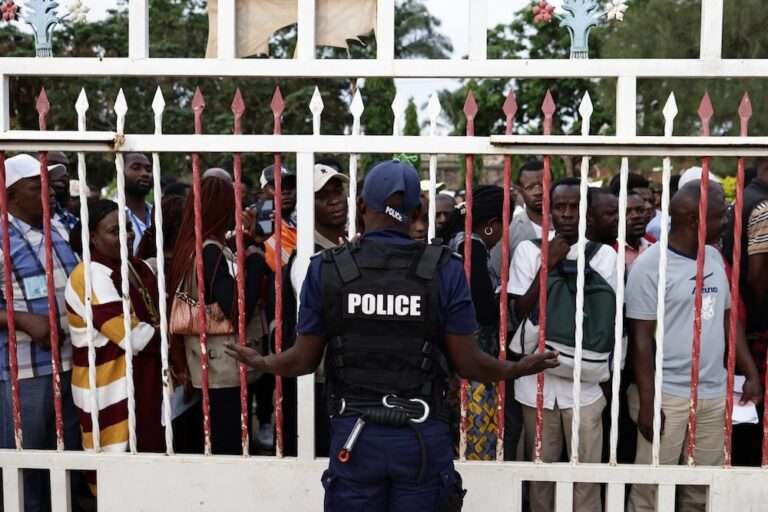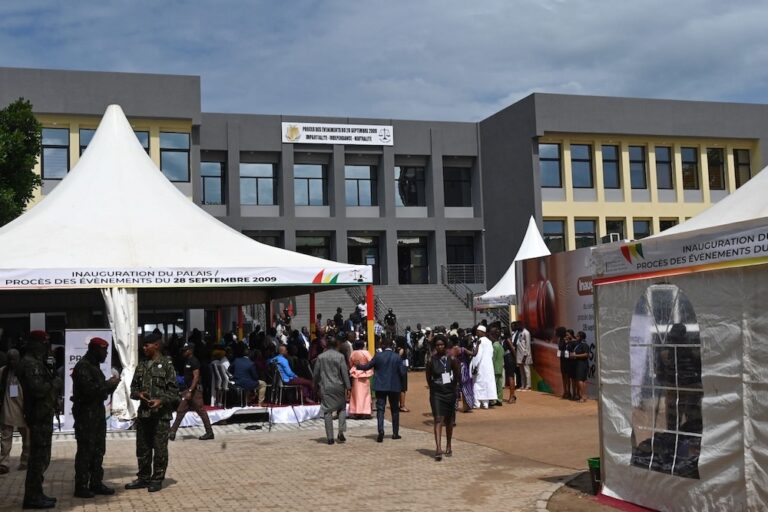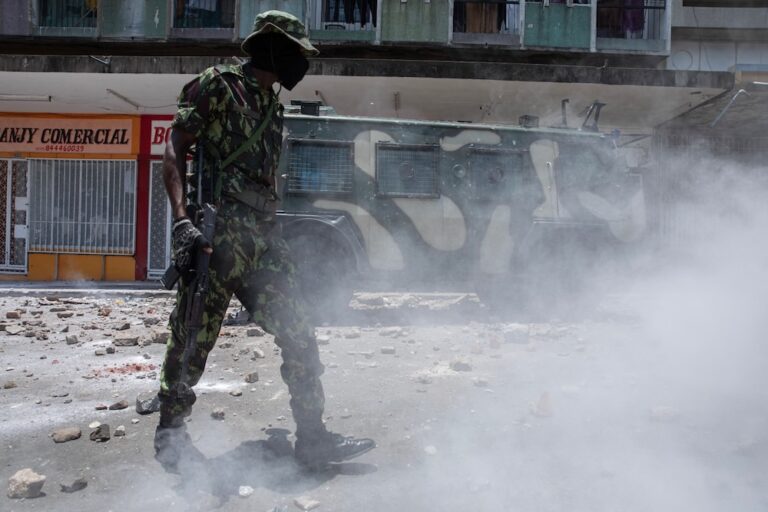March 2023 in Africa: A free expression round up produced by IFEX’s Regional Editor Reyhana Masters, based on IFEX member reports and news from the region.
March was a month of mayhem on the African continent – with homophobic sentiment on the rise in Kenya and Uganda, ruthless crackdowns on protests in Mozambique, South Africa, Kenya, Nigeria, and Senegal, and the suspension of French media in Burkina Faso.
Jubilation over release of Olivier Dubois
Let’s start with some good news. A glimmer of brightness was sparked by the release of French freelance journalist Olivier Dubois. On 20 March, Dubois arrived at Niger’s Niamey airport, following negotiations by Nigerien authorities. He had been held captive by militants in Mali for 711 days.
Dubois went missing on 8 April 2021, and his abduction was confirmed via a video message, in which Dubois communicated that he had been kidnapped by the “Support Group for Islam and Muslims” (JNIM) in Gao.
In a partially related incident, Burkina Faso’s military junta temporarily suspended France 24 from broadcasting in the country.
According to a Media Foundation for West Africa (MFWA) report, the Burkinabé government said it was ”saddened to see that the head of a terrorist organization like AQIM and recognized as such by the entire international community can be offered the editorial generosity of France 24, to talk at length on the channel’s airwaves.”
The French radio station stated that although they had an exclusive interview with Abu Obeida Youssef al-Aanabi, the head of al Qaeda in the Islamic Maghreb (AQIM), he was not invited to speak directly on any of their programmes and they had only reported on his comments.
“Furthermore, this column enabled us to confirm for the first time that the French hostage Olivier Dubois, who has since been released, was held by AQIM,” added France 24.
In December last year, the military junta also suspended Radio France International (RFI) broadcasts for “having relayed an intimidation message attributed to a terrorist leader”, as reported by the Committee to Protect Journalists.
Homophobia on the rise
“Among the worst”: Punitive anti-gay law in Uganda
As the 2023 Anti-Homosexuality Bill awaits President Yoweri Museveni’s signature, mothers of LGBTQI+ persons in Uganda wrote an open letter to the head of state imploring him not to assent to it.
“Our children are not punching bags; our children are not enemies of the state. Our children are not disgusting. Our children are not any of the derogatory names they have been tethered with; our children are not criminals or anti-government. Our children are more than their sexuality and gender identity. Our children are Ugandan citizens, just like you and me.”
Volker Turk, the UN high commissioner for human rights, said that “[t]he passing of this discriminatory bill – probably among the worst of its kind in the world – is a deeply troubling development.” It would impose the death penalty in certain circumstances, which UN experts have called “an egregious violation of human rights.”
The bill also seeks to propose 10-year jail sentences for same-sex relations, and even goes to the extent of prescribing punitive measures for family members or friends who support LGBTQI+ people or fail to report them to authorities.
Kenya: Seeking salvation by marginalising homosexuality?
In neighbouring Kenya, moral outrage took centre stage as First Lady Rachel Ruto called for national prayers against homosexuality. According to a Kenya Broadcasting Corporation report, she said: “we don’t wish to have that conversation on LGBTQ because that is not what our tradition or religion talk about in this great country of Kenya.”
First Lady Ruto’s reaction was sparked by a February 2023 ruling by Kenya’s Supreme Court allowing the National Gay and Lesbian Human Rights Commission (NGLHRC) to officially register as a non-governmental organisation (NGO).
The organisation’s application to register as an NGO, dating back to 2013, was initially denied by the Non-Governmental Organizations Coordination Board. As Human Rights Watch reported at the time, the Board refused on the grounds that “the name of the organization was ‘unacceptable,’ and that it could not register it because Kenya’s penal code criminalizes gay and lesbian liaisons.” The decision was successfully challenged by the former executive director of the NGLHRC, Eric Gitari, before the High Court.
The passage of the Anti-Homosexuality Bill 2023 in Uganda and the Kenyan first family’s anti-gay position has emboldened hate speech against LGBTQI+ communities in both countries. Amnesty International expressed their concern at the “increasing incidents of malicious online and offline comments, profiling, and public demonstrations against persons who identify as inter-sex, gay, lesbian, or non-binary.”
Social justice at the core of protests
March saw a wave of protests across Africa. The serious issues being contested by citizens in Mozambique, Nigeria, Kenya and Senegal ranged from corruption, contested election results, the high cost of living, and rising unemployment.
Authorities in Mozambique responded to peaceful protests by firing teargas, assaulting protestors and targeting organisers. The nationwide protests by youth across the country, which were approved beforehand, were held to honour protest rapper and fierce government critic Azagaia, who passed away earlier in the month. The 38-year-old icon had focused on social injustice, climate change, the mistreatment of people by authorities, poverty and corruption.
Amnesty International suggests that the police “were aiming to suppress the demonstrations, with the intention of belittling Azagaia’s legacy in Mozambique.” It called on authorities to “swiftly investigate police who arrested people in Maputo and subjected them to beating, and ensure that they are brought to account for violating the human rights of protesters, including international law.”
Delays over the announcement of Nigeria’s February election results, coupled with a contested outcome, sparked a series of protests in the country. The first, on 6 March, was led by second-place candidate, Atiku Abubakar of the Peoples’ Democratic Party. This was followed by daily protests initiated by civil society organisations aiming to coerce the Independent Nigerian Electoral Commission into reviewing the February and March presidential, gubernatorial and parliamentary elections.
Nigeria’s pre-electoral landscape had been marked by spiking violence, deep divisions, intimidation and voter suppression, which culminated in a chaotic and badly managed polling day. IFEX members Media Rights Agenda and the International Press Centre documented numerous violations against media personnel in the pre- and post-election period. Journalists were attacked by both security agencies and political party activists, and in many cases their phones were seized and footage deleted.
In neighbouring Kenya, accusations of electoral fraud and the high cost of living spurred Kenyans onto the streets. Their protests were brutally suppressed by security and state agencies, ultimately resulting in the death of William Mayange, a third-year student at Kenya’s Maseno University, as well as numerous injuries and the arrest of over 200 protestors.
Journalists covering the protests bore the brunt of the violence, with the Media Council of Kenya describing March 2023 as the “darkest month” for Kenyan media. The Kenyan Editors Guild issued a statement expressing their alarm at the violent attacks on journalists covering the Azimio protests across Nairobi.
Amnesty International reports that far ahead of the Senegal’s anticipated 2024 elections, authorities have been “cracking down on human rights, restricting civic space, banning protests and detaining a journalist and opposition figures”. The ongoing protests in the country centre around what fervent supporters of politician Ousmane Sonko believe is a smear campaign and targeted attack against the opposition leader.
In March, Sonko received a two-month suspended prison sentence for libel for accusing the tourism minister of embezzlement. While this conviction will not impact his ability to run for president, rape charges stemming back to 2021 will have a different outcome; if convicted, he will be disqualified from running for office.
Caught in the middle of these court hearings and clashes are the media. Senegal’s decline in press freedom has been gradual but pervasive. Media houses have been attacked or blocked from covering the news, and media personnel harassed and intimidated. Two journalists in particular – Papa Ndiaye and Pape Ale Niang – have been arrested and rearrested in relation to their reporting on Sonko and his court hearings.
In brief
Nigerian Adekunle Adebajo’s feature article Keeping up with the Chibok Girls and Zimbabwean Farai Shawn Matiashe’s report on an all-women fishing cooperative on the Zambezi River were awarded the prestigious Michael Elliott award for Excellence in African Storytelling.
FESPACO – the continent’s largest film festival, held bi-annually in Ouagadougou, Burkina Faso – went ahead despite security concerns over the unrest and terrorism threat faced by the West African country.
MFWA has refuted assertions made by President Nana Akufo Addo during his state of the nation address where he spoke about Ghana’s enviable media freedom landscape. As they point out: “While freedom of expression is guaranteed under Ghana’s 1992 Constitution, this freedom is undermined when those exercising it fear retribution in the form of threats, arrest and physical attacks, as has been the case for many journalists and activists under the Akufo-Addo administration.”
Eighty-six civil society organisations have reiterated their appeal to Rwandan authorities to allow an independent, impartial and effective investigation into suspicious circumstances surrounding the death of journalist John Williams Ntwali.



